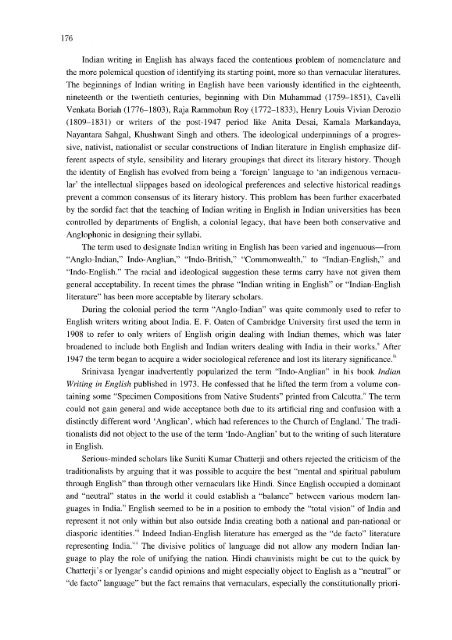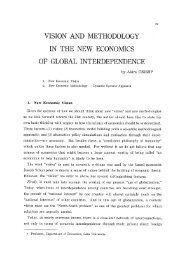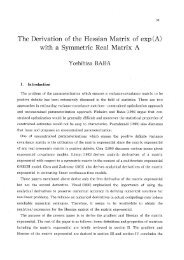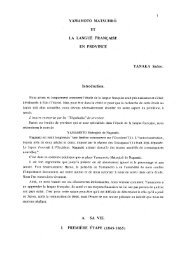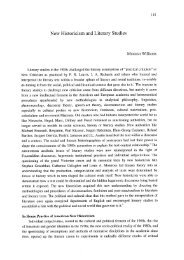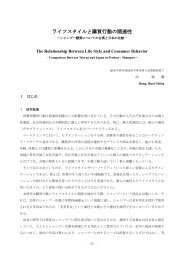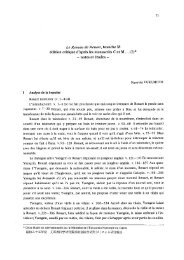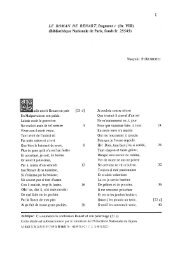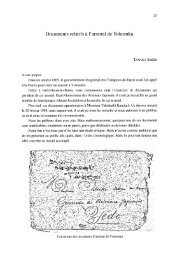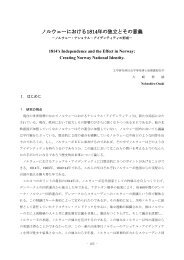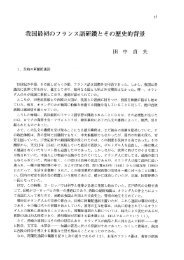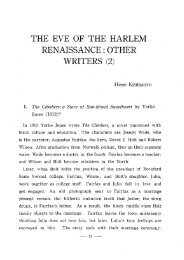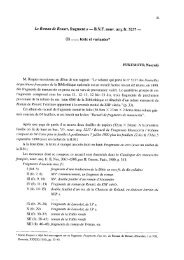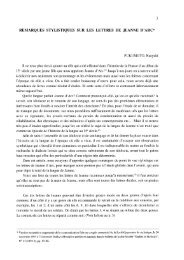Indian Writing in English 1794-2004 - Soka University Repository
Indian Writing in English 1794-2004 - Soka University Repository
Indian Writing in English 1794-2004 - Soka University Repository
You also want an ePaper? Increase the reach of your titles
YUMPU automatically turns print PDFs into web optimized ePapers that Google loves.
176<br />
<strong>Indian</strong> writ<strong>in</strong>g <strong>in</strong> <strong>English</strong> has always faced the contentious problem of nomenclature and<br />
the more polemical question of identify<strong>in</strong>g its start<strong>in</strong>g po<strong>in</strong>t, more so than vernacular literatures.<br />
The beg<strong>in</strong>n<strong>in</strong>gs of <strong>Indian</strong> writ<strong>in</strong>g <strong>in</strong> <strong>English</strong> have been variously identified <strong>in</strong> the eighteenth,<br />
n<strong>in</strong>eteenth or the twentieth centuries, beg<strong>in</strong>n<strong>in</strong>g with D<strong>in</strong> Muhammad (1759-1851), Cavelli<br />
Venkata Boriah (1776-1803), Raja Rammohun Roy (1772-1833), Henry Louis Vivian Derozio<br />
(1809-1831) or writers of the post-1947 period like Anita Desai, Kamala Markandaya,<br />
Nayantara Sahgal, Khushwant S<strong>in</strong>gh and others. The ideological underp<strong>in</strong>n<strong>in</strong>gs of a progres-<br />
sive, nativist, nationalist or secular constructions of <strong>Indian</strong> literature <strong>in</strong> <strong>English</strong> emphasize dif-<br />
ferent aspects of style, sensibility and literary group<strong>in</strong>gs that direct its literary history. Though<br />
the identity of <strong>English</strong> has evolved from be<strong>in</strong>g a `foreign' language to `an <strong>in</strong>digenous vernacu-<br />
lar' the <strong>in</strong>tellectual slippages based on ideological preferences and selective historical read<strong>in</strong>gs<br />
prevent a common consensus of its literary history. This problem has been further exacerbated<br />
by the sordid fact that the teach<strong>in</strong>g of <strong>Indian</strong> writ<strong>in</strong>g <strong>in</strong> <strong>English</strong> <strong>in</strong> <strong>Indian</strong> universities has been<br />
controlled by departments of <strong>English</strong>, a colonial legacy, that have been both conservative and<br />
Anglophonic <strong>in</strong> design<strong>in</strong>g their syllabi.<br />
The term used to designate <strong>Indian</strong> writ<strong>in</strong>g <strong>in</strong> <strong>English</strong> has been varied and <strong>in</strong>genuous—from<br />
"Anglo -<strong>Indian</strong>," Indo-Anglian," "Indo-British," "Commonwealth," to "<strong>Indian</strong>-<strong>English</strong>," and<br />
"Indo -<strong>English</strong> ." The racial and ideological suggestion these terms carry have not given them<br />
general acceptability. In recent times the phrase "<strong>Indian</strong> writ<strong>in</strong>g <strong>in</strong> <strong>English</strong>" or "<strong>Indian</strong>-<strong>English</strong><br />
literature" has been more acceptable by literary scholars.<br />
Dur<strong>in</strong>g the colonial period the term "Anglo-<strong>Indian</strong>" was quite commonly used to refer to<br />
<strong>English</strong> writers writ<strong>in</strong>g about India. E. F. Oaten of Cambridge <strong>University</strong> first used the term <strong>in</strong><br />
1908 to refer to only writers of <strong>English</strong> orig<strong>in</strong> deal<strong>in</strong>g with <strong>Indian</strong> themes, which was later<br />
broadened to <strong>in</strong>clude both <strong>English</strong> and <strong>Indian</strong> writers deal<strong>in</strong>g with India <strong>in</strong> their works.' After<br />
1947 the term began to acquire a wider sociological reference and lost its literary significance."<br />
Sr<strong>in</strong>ivasa Iyengar <strong>in</strong>advertently popularized the term "Indo-Anglian" <strong>in</strong> his book <strong>Indian</strong><br />
<strong>Writ<strong>in</strong>g</strong> <strong>in</strong> <strong>English</strong> published <strong>in</strong> 1973. He confessed that he lifted the term from a volume con-<br />
ta<strong>in</strong><strong>in</strong>g some "Specimen Compositions from Native Students" pr<strong>in</strong>ted from Calcutta.`' The term<br />
could not ga<strong>in</strong> general and wide acceptance both due to its artificial r<strong>in</strong>g and confusion with a<br />
dist<strong>in</strong>ctly different word `Anglican', which had references to the Church of England." The tradi-<br />
tionalists did not object to the use of the term Indo-Anglian' but to the writ<strong>in</strong>g of such literature<br />
<strong>in</strong> <strong>English</strong>.<br />
Serious-m<strong>in</strong>ded scholars like Suniti Kumar Chatterji and others rejected the criticism of the<br />
traditionalists by argu<strong>in</strong>g that it was possible to acquire the best "mental and spiritual pabulum<br />
through <strong>English</strong>" than through other vernaculars like H<strong>in</strong>di. S<strong>in</strong>ce <strong>English</strong> occupied a dom<strong>in</strong>ant<br />
and "neutral" status <strong>in</strong> the world it could establish a "balance" between various modem lan-<br />
guages <strong>in</strong> India."' <strong>English</strong> seemed to be <strong>in</strong> a position to embody the "total vision" of India and<br />
represent it not only with<strong>in</strong> but also outside India creat<strong>in</strong>g both a national and pan-national or<br />
diasporic identities.'" Indeed <strong>Indian</strong>-<strong>English</strong> literature has emerged as the "de facto" literature<br />
represent<strong>in</strong>g India."' The divisive politics of language did not allow any modern <strong>Indian</strong> lan-<br />
guage to play the role of unify<strong>in</strong>g the nation. H<strong>in</strong>di chauv<strong>in</strong>ists might be cut to the quick by<br />
Chatterji's or Iyengar's candid op<strong>in</strong>ions and might especially object to <strong>English</strong> as a "neutral" or<br />
"de facto" language" but the fact rema<strong>in</strong>s that vernaculars , especially the constitutionally priori-


